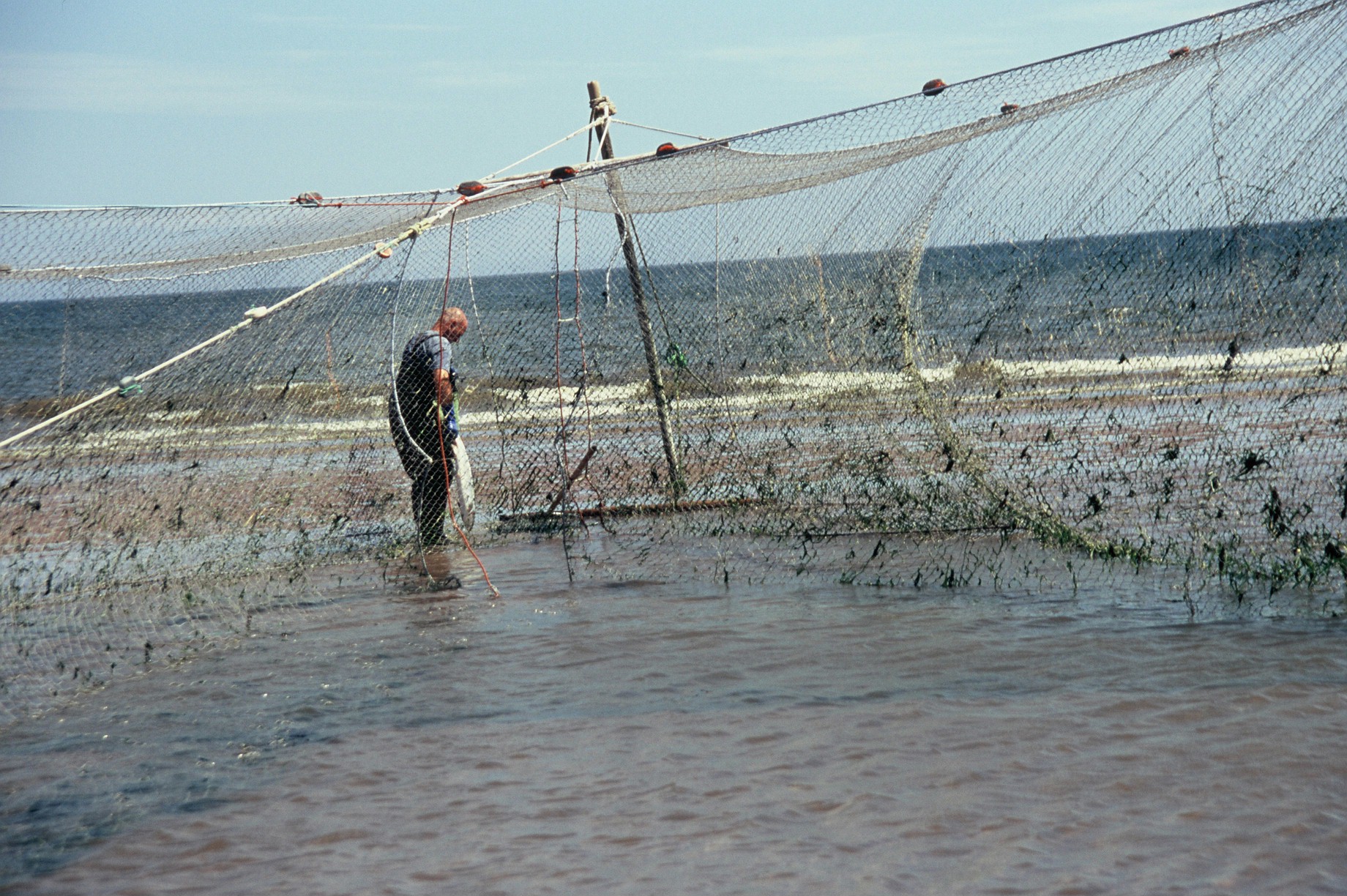THE wild fish lobby can huff and puff as much as it likes, but the latest spat over coastal salmon netting around Scotland demonstrates just how divided the warring factions are and illustrates pointedly Government dithering about how to solve the issues.
In the red corner are the Association of Salmon Fishery Boards (ASFB), the Atlantic Salmon Trust (AST), the Rivers and Fisheries Trusts (RAFTS) and the Salmon & Trout Association (S&TA), four heavyweight organisations which between them wield some hefty financial and political clout, including Royal patronage.

In the blue corner is Usan Fisheries, an artisan business based just south of Montrose, Angus, which prides itself on its thriving traditional coasting netting operations for salmon and sea trout.
Usan nets the east coast of Scotland from Auchmithie just north of Arbroath across the mouths of both the south and north Esks to about the Aberdeenshire boundary. It was founded by the Pullar family in the early 1960s and supplies both fresh and smoked game fish to the catering and retail trade, supplemented by lobster, crab and sea bass.

Holding the jackets is Richard Lochhead, the Scottish rural affairs minister, whose attempt to diffuse the controversial “mixed stock” coastal netting dispute rebounded earlier this year when a 20-month working group he set up comprising all interested parties, failed to reach a consensus and ended up labelled a “fudge.”
Last week Usan thumbed its nose at angling and wild fish interests by securing a £100,000 EU grant to improve its business. The money will be used to create new net and boat building and repair facilities and the owners went as far as to thank Scottish ministers and Marine Scotland for their support of “traditional and sustainable” wild salmon netting.
Predictably, outrage from anglers and conservationists followed. Until last week, the chairman of the ASFB was Hugh Campbell Adamson, an Angus landowner at Stracathro, and coincidentally also chairman of the Esk District Salmon Fishery Board. His ASFB successor, Alan Williams, howled:
“It beggars belief that public money is being used to improve the effectiveness of a major mixed-stock salmon netting operation given the international consensus that exploitation of fish outside their river of origin is poor management practice.”
There could be little doubt, he asserted, that the Scottish Government bore considerable responsibility for the award of the EU grant because it advised on, vetted and signed off fishery grant applications from Scottish companies.
“On the one hand Scottish Government pays lip-service to salmon conservation, whilst on the other it gives financial and marketing support to those who seek to maximise commercial exploitation of our wild salmon before they reach their river of origin,” he said.
The Pullars remain unrepentant and unruffled by the latest broadside from the anglers and are quoted saying that the dispute is more about the extermination of traditional netting, rather than species conservation. They say their bag and jumper nets “prevent damage to the fish” and freely acknowledge that their catches are “the harvest of some of eastern Scotland’s most famous salmon rivers” including the Tay, South Esk, North Esk, Dee and Don.
And therein lies the crux of the issue.
Readers of Between the Lines will be familiar with the “mixed stock” problem. We commented on some of the background in May, and have regularly highlighted the growing threat posed to salmon conservation – especially at sea.
The inter-governmental North Atlantic Salmon Conservation Organisation (NASCO) – to which the UK is a signatory – has heard dire warnings from Greenland and Faroese deep sea fisherman who ceased drift netting for salmon on condition that their actions were reciprocated by coastal netsmen, that they will rescind their moratorium. Scotland and Norway have been particularly slow to act and singled out for criticism.
NASCO says existing Scottish mixed stock fisheries “present a threat to the conservation of salmon stocks”. The 50 or so remaining netting operations account for 30% of total salmon and sea trout exploitation.
Other organisation such as ICES and the EU itself are raising the stakes in calling for more stringent methods of conservation for the iconic, but much-threatened, Atlantic salmon. The EU has designated the Tay, Dee and South Esk as three Special Areas of Conservation (SACs) for salmon under their Habitats Directive – a status which the Scottish Government is legally obliged to protect.
Tony Andrews, chief executive of the AST, one of the foremost campaigners for conservation of the species, points out that populations of early-running salmon in all three rivers are not as abundant as they were only 30 years ago. The South Esk is particularly badly affected. He says:
The AST’s position is that uncertainty on the viability of stocks in these three rivers, from which the Usan mixed stock fishery kills large numbers of salmon, dictates the necessity of applying the precautionary measure of closing this net fishery with immediate effect.”
Usan merely points to the uncomfortable fact that it has heritable title to the fishery which has been in its family for four generations and says, bluntly, that it intends to continue its traditional netting operations into the future.
The author of this year’s “mixed stock” working group report, David Crawley of Scottish Natural Heritage, suggested at its publication that the Government appoint an assessor to provide independent mediation to help resolve disputes between conflicting salmon interests. He also said, with some optimism, that he wanted to see a firm pathway towards legislative changes by September. We are still waiting.
The dilemma for Lochhead is becoming acute and he faces some tricky political decisions in the run up to the Holyrood election next spring. Freshwater angling, including game fishing is worth some £113 million a year to the Scottish economy, and is backed by powerful and influential interests. There are serious conservation overtones to the wild fish lobby and mounting international pressures for Scotland to be seen to act decisively in harmony with other European countries.
Lochhead by his own admission is no angler. But as MSP for a strong sea fishing community in Moray, he has consistently kept on cosy terms with the commercial sector, from deep sea fishing to aquaculture. He can ill afford to disaffect a sizeable proportion of his constituents, nor those of his boss Alex Salmond who represents neighbouring Banff and Buchan, no matter how loudly the wild fish lobby wails.
Despite EU habitat directives and well-intentioned conservation campaigns, the astute politician will do what all politicians do in times of difficulty and an impending public vote. They maintain the status quo and certainly don’t rock the boat unless backing a sure-fire winner.
Coastal netting may be small – and shrinking – in strictly economic terms, but the two sides in the dispute are bitterly divided and the odds on Lochhead and the SNP consigning the netsmen to the deep at least in the short-term, seem stacked against the anglers.
Related articles:
Why it’s your turn to play politics with salmon
‘Sword of Damocles’ over future of wild Scottish salmon
4 Responses
fair play to the netters! Looks like a valuable part of our heritage. Live and let live I say!
I have been one of the mixed stock fisheries working group for netting interests.
I feel the angling interests are not really bothered about salmon conservation as preserving the species, but are looking for the lion’s share to enhance their own businesses.
Even with so-called catch-and-release they still kill three times more salmon and grilse than all the Scottish netting industry put together.
As a member of the Salmon Net Association of Scotland we have voluntarily given up six weeks of our season reviewed annually.
Angling interests have not given the same commitment; all can clearly be seen – fish held up to be photographed in the local newspapers as early as January and Feburary.
Angling proprietors going under the umbrella of catch and release are still generating large incomes from letting their beats from January onwards, when Scottish netsmen are trying to conserve salmon stocks.
W,e as netsmen, fish for our living, employ local people and supply high quality food.
Wealthy angling groups use the salmon as a leisure activity.
Granted they give employment to people, but so did netting, until they bought out the rights
You don’t need to be a rocket scientist to conclude that we are absolutely barmy to allow this crazy impasse to continue. The facts are:
1) tourism angling for salmon is worth more than ten times the value of the wild salmon netting industry. A wealthier Scotland needs more high value angling tourists who will not come to Scotland if they hear that large numbers of salmon from unknown rivers of origin are being banged on the head and sent off to Billingsgate Market. WEALTHIER.
2) mixed stocks coastal netting is simply bad fisheries management. All the responsible international salmon conservation bodies agree that the practice should be phased out as soon as possible. By taking salmon from potentially fragile populations from stocks of unknown origin the Precautionary principle is being ignored. If we want a greener Scotland we have to manage our natural resources better than this. GREENER.
3) the ‘artisanal fishermen’ of our coasts are portrayed as family groups of owners of heritable rights who are plying their trade as generations have before them. This is good ‘spin’ of the kind we all have been forced to accept as part of modern governance. It is manifestly UNFAIR that these devastatingly effective fisheries continue enriching themselves massively at the expense of the wider rural community by continuing to kill as many fish as they possibly can without quota and without proper supervision. If we want a FAIRER SCOTLAND it is necessary and urgent that the government decides if it wants to oversee the continuing decline of Scottish salmon by allowing this outdated form of exploitation to continue. These so called ‘artisanal netsmen’ are not that at all: they are extremely efficient and damaging businesses practising a discredited and unsustainable form of exploitation.
Would it not be better for the Government to live up to its three aspirations for the future – a WEALTHIER, GREENER and FAIRER Scotland – by sorting out the mixed stocks issue once and for all?
All valid points and well made. The on-going snag is that the netsmen (a) have a heritable title to carry on their businesses and, (b) are supported by the Government. And neither of these parties seem willing to change the situation currently. – GM.